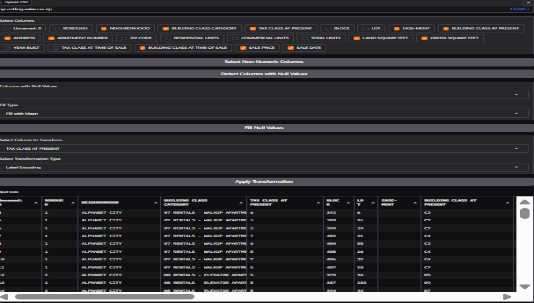- Tel: (+91) 9874375544
- Email: info@jisiasr.org
A Hub for Interdisciplinary Research, Advanced Analytics, and Future Technologies
Centre for Data Science, JISIASR Kolkata, is dedicated to training skilled postgraduate professionals in Data Science to meet the challenges of the technological revolution. Focused on translational research-based education, we prepare students for Industry 4.0 through internships with leading industries and academic institutes across India, alongside industry-oriented projects that enhance domain knowledge and practical skills.
We strive to transform society through innovative education, interdisciplinary research, creativity, and entrepreneurship, fostering a brighter future.
To cultivate analytical minds and intellectual curiosity by delivering education centered on Data Science expertise, problem-solving, communication, and leadership skills.
We are committed to advancing knowledge by fostering a collaborative environment that encourages the free exchange of ideas, promoting research, creativity, innovation, and entrepreneurship. Our mission is to empower individuals to reach their full potential, address global challenges with a creative and scientific mindset, and uphold the highest ethical standards.
The institute champions a culture that respects nature, protects the environment, and welcomes diverse creative minds from across the globe.
| Requirement | Details |
| Qualification | B.E./B.Tech/M.Sc. in CSE, IT, ECE, Maths, Stats/ equivalent. Final Year eligible |
| Min. Marks | 50% (45% for reserved category) |
| Entrance | GATE / PGET (WB) / JISIASR Test |
Areas: AI and machine learning / Medical image processing / Business analytics / Cybersecurity / Natural language processing / Blockchain / IoT / Satellite image processing / Cryospheric science
Students will master Probability and Statistics, Advanced Database Management Systems, Mathematical Modeling for Data Analytics, and Visualization Techniques. They will gain expertise in Machine Learning, Artificial Intelligence, and tools to tackle Big Data challenges, with a focus on Advanced Data Analytics and Data Security. The curriculum includes theory, hands-on implementation, and annual term projects.
Graduates will be equipped to address industry challenges in sectors like healthcare, transportation, finance, and business. With a strong foundation in Data Science and Machine Learning, they can manage multidisciplinary projects and pursue careers as Data Scientists, Data Analysts, Learning Scientists, Business Analysts, Data Architects, and more.
| # | Product Name | Description | |
| 1 | AYURR-AI 360 (Adaptive Yet User-Focused Remedy Recommendation System) |
AI-based system for recommending Ayurvedic treatments tailored to individual needs. |  |
| 2 | Speech-to-Text Summarizer | Tool that transcribes, translates, and summarizes live speech inputs efficiently. |  |
| 3 | Data Preprocessing Tool | No-code platform for comprehensive data cleaning and preprocessing for ML workflows. |  |
| Role | Examples |
| Data & AI Roles | Data Scientist, ML Engineer, AI Developer |
| Research & Analytics | AI Analyst, R&D Scientist, Data Architect |
| Business & Tech | BI Expert, Cloud Data Engineer |
| Advanced Study | Ph.D. in AI, DS, Biomedical Computing |
| Entrepreneurial | Startup Founder, Tech Consultant |
Sponsoring Agency: Central Council for Research in Homoeopathy (CCRH)
Duration: 1 Year
This project applies unsupervised learning techniques, including clustering, NLP, and GAN-based augmentation, to analyze clinical records and literature for identifying symptom patterns. The goal is to enhance the accuracy of homoeopathic remedy selection.
Sponsoring Agency: Anusandhan National Research Foundation (ANRF)
Duration: 3 Years
This project focuses on identifying standardized EEG-based biomarkers to detect Screen Addiction Disorder (SAD) in children. Machine learning analysis of brainwave patterns aims to distinguish SAD from related conditions and guide effective interventions.
Sponsoring Agency: Central Council for Research in Homoeopathy (CCRH)
Duration: 1 Year
This project develops an AI-driven predictive model integrating NLP and machine learning to analyze clinical data and homeopathic texts for accurate remedy selection. It continuously learns from patient outcomes to enhance dosage optimization and treatment precision.
Next-gen security using AI/ML enables smarter, adaptive threat detection with reduced false positives. It protects infrastructure, cloud, and endpoint systems with automated, scalable incident management.
AI-driven ABAC dynamically evaluates users and context for secure, seamless access control. It enhances security in healthcare, IoT, and cloud, though privacy and explainability remain challenges.
Image-based ML models detect skin diseases early, offering fast, low-cost, non-invasive screening. The system leverages computer vision but depends on large datasets and expert validation.
BioNLP extracts insights from vast biomedical texts to aid drug discovery and personalized care. AI-powered tools process unstructured clinical data, improving decision-making and healthcare outcomes.
NLACP extraction from text helps contextualize language for smarter, rule-based NLP systems. Techniques like ML and deep learning improve interpretation, despite domain and ambiguity challenges.
ML applied to MEG signals reveals unique brain connectivity features linked to autism in children. Novel spectral and spatial biomarkers offer promise for early ASD diagnosis and intervention.
AI analyzes corporate language beyond sentiment to uncover hidden impression management tactics. Context-aware NLP and explainable models ensure trustworthy and nuanced corporate insight.